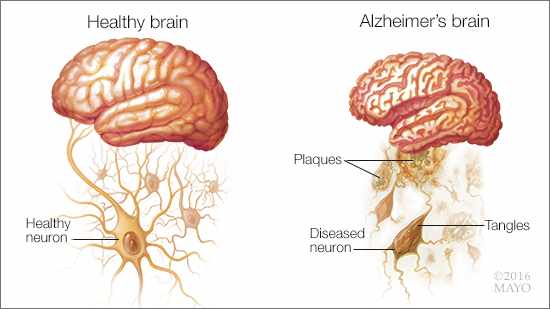-
Mayo Clinic Q and A: Identifying Alzheimer’s in Its Earliest Stages

DEAR MAYO CLINIC: How soon can Alzheimer’s disease be diagnosed? What are the early symptoms to watch for?
ANSWER: There is no one test that can be used to diagnose Alzheimer’s disease. But, based on an assessment of symptoms, along with a variety of tests and exams, Alzheimer’s often can be identified in its earliest stages. Seeking medical attention as soon as Alzheimer’s symptoms become noticeable is key to a prompt diagnosis.
The most common early symptom of Alzheimer’s disease is forgetfulness. Distinguishing between memory loss that is due to aging and memory loss due to Alzheimer’s can be tricky though.
As people get older, the number of cells, or neurons, in the brain goes down. That can make it harder to learn new things or to remember familiar words. Older adults may have difficulty coming up with names of acquaintances, for example, or they may have trouble finding reading glasses or car keys. In most cases, these memory lapses do not signal the beginning of Alzheimer’s disease.
The type of forgetfulness that is worrisome involves forgetting information that a person formerly always would have remembered. For example, a favorite social event gets missed, like a tee time for a weekly golf game. Or, a calendar item that an individual usually would make a priority goes unnoticed, like a doctor’s appointment. If this happens once in a while, it probably is not a problem. If a person starts to have trouble making these connections regularly, then it is time to see a doctor.
A medical evaluation also is in order if memory lapses lead to problems in a person’s day-to-day life or if someone begins to have trouble with mental tasks. Examples include becoming overwhelmed or confused when faced with decisions, having a difficult time driving, getting irritated or upset when mental concentration is required to complete a task, getting lost on the way to a familiar location, or having trouble following step-by-step instructions.
Another early warning sign of Alzheimer’s can be a change in behavior or personality, for example, a normally outgoing person who withdraws from friends and family and refuses social engagements. Depression and other mood changes may be symptoms of early Alzheimer’s, too.
If, after reviewing a person’s symptoms, a doctor suspects Alzheimer’s, tests that assess memory and other thinking skills, judge functional abilities and identify behavior changes can be useful in determining if Alzheimer’s could be to blame. Talking with family members about a person’s cognitive skills, functional abilities and daily behaviors, and how they have changed over time is often helpful, too.
Imaging exams and laboratory tests can help show what is happening within the brain. Brain images obtained through CT, MRI or other scans may be able to show loss of brain cells or the development of proteins known to contribute to Alzheimer’s. Laboratory tests can help rule out other disorders that can cause symptoms similar to those of Alzheimer’s disease, such as a thyroid disorder or vitamin B-12 deficiency. This type of thorough evaluation often can diagnose Alzheimer’s disease in its early stages.
Timely, accurate diagnosis is important, because, once the disease has been identified, doctors may be able to offer medications to help manage Alzheimer’s symptoms and possibly slow decline in memory and other cognitive skills. Knowing they are dealing with Alzheimer’s when it’s still in its early stages also allows people with the disease, and their families, to learn about ways to cope and to take time to plan for the future. — Ronald Petersen, M.D., Ph.D., Alzheimer’s Disease Research Center, Mayo Clinic, Rochester, Minnesota







